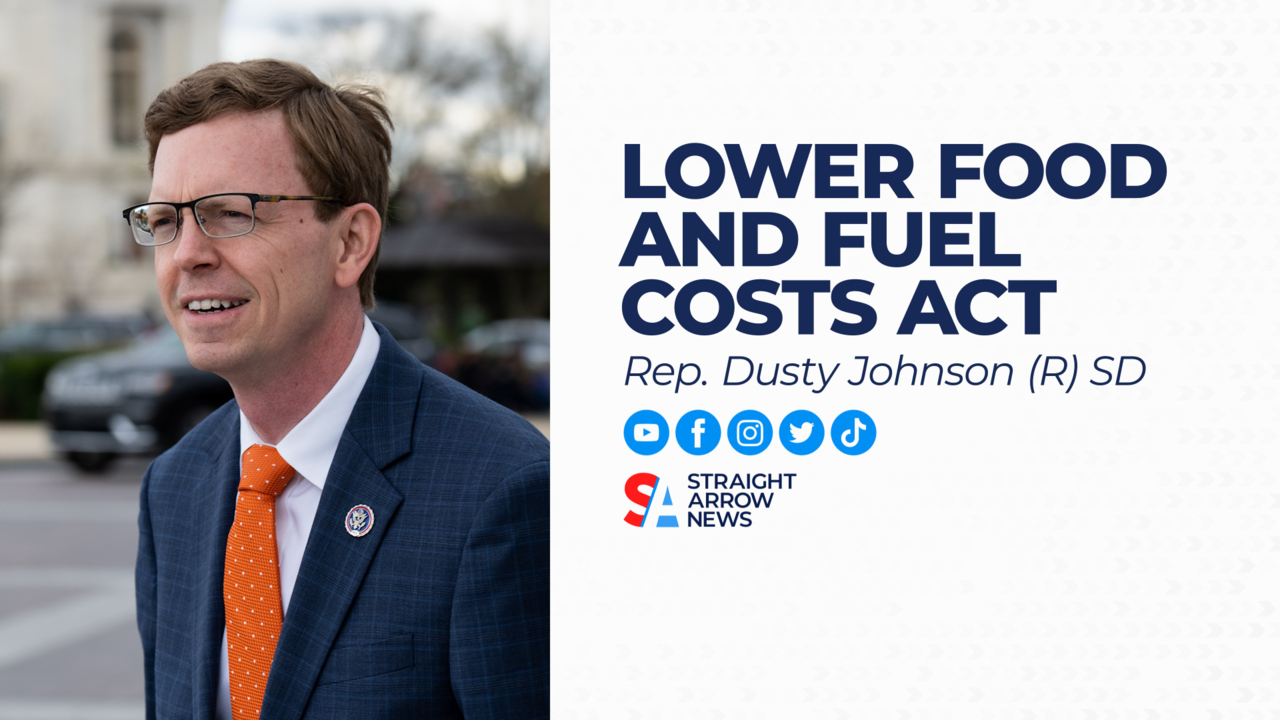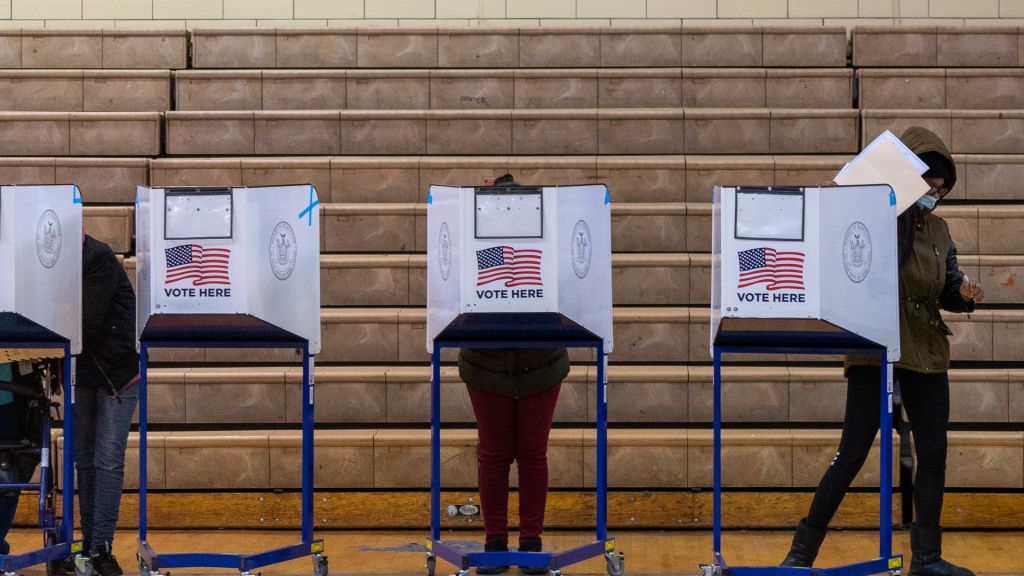
Ray Bogan: The House of Representatives passed the lower food and fuel costs act. A bill lawmakers hope will target inflation by providing assistance to farmers and allowing the year round sale of gasoline with a 15% ethanol blend.
The legislation passed mainly along party lines, and Congressman Dusty Johnson from South Dakota was just one of several Republicans to vote in favor. And he joins us now to discuss that and more important news, Congressman Johnson, thank you so much for joining us today.
Rep. Dusty Johnson – R-SD: Thanks for having me.
Ray Bogan : So my first question is this bill targets inflation and tries to lower the food and fuel costs, as it says in the name for consumers. But it does that by mainly focusing on producers like helping farmers with their fertilizer prices, or for instance, allowing for the year round sale of e 15. There’s also grants in there to help gas gas stations retrofit their pumps and their tanks so it can handle that type of gas. Why is it important when you’re making a bill to lower the cost to consumers to make things easier on the producers?
Rep. Johnson: Well, because the producers are the ones who are creating this product. And we know the laws of supply and demand are pretty gosh darn powerful. And moving to e 15. As opposed to 10% ethanol, e 10. Would overtime add an extra 8 billion gallons a year to the food to the fuel supply system that’s gonna have a big impact to consumers who could feel real reliefs in their pocketbooks.
Ray Bogan There’s also another bill that came out recently the ocean shipping Reform Act. And that is trying to make things easier, again, on American shippers. And one of the big things that it does is it prevents foreign shipping companies from denying space on ships to American producers who are trying to export their goods. In what way does that impact inflation?
Rep. Johnson: Well, you’re exactly right. Yeah, in your description of the bill. And right now all five of the big ocean carriers, the guys who haul stuff from America to Asia, or from Asia to America, our foreign flag, I wish there were American companies in this space, but there are not. And I think a free market has many buyers and many sellers. But when you’ve only got five big boys controlling the market, they have tremendous influence over the pricing. And they have not been treating American products well. And so the reason this, you know impacts inflation is when they make it harder to get stuff into this country, or harder to get stuff out that affects Americans on both ends of the spectrum. And so our bill just makes it very clear. Listen, if you’re going to use American ports, you have to play by some basic rules of the road, including not discriminating against American goods. This is a this is a much bigger bill than most people realize. In fact, it’s the biggest reform of our nation’s shipping laws in a generation. And it’s kind of happened underneath the surface, it has not gotten anywhere near as much attention as I think it deserves.
Ray Bogan: Yes, it’s there are some things that in Washington, DC that are esoteric, and maybe very academic, for people who are in that specific industry, but it does have a big impact on on the consumer as a whole. Let me get back to the lower food and fuel costs back, though real quickly, because on fertilizer, the war in Ukraine has had a very big impact on the price of fertilizer and the availability of fertilizer. And the USDA would provide $500 million to farmers under this bill to help lower their fertilizer use. How are farmers being particularly impacted by inflation and the Ukraine war right now?
Rep. Johnson: Well, we’ve got Ukraine and Russia who together account for about a third of all of the wheat grown in the world, you think about how important bread is to keeping people fed. And also a tremendous amount of fertilizer is manufactured in those two countries. And America does not have enough, you know, domestic production of fertilizer long term. That’s where we need to do. That’s what we need to do. We need to build that domestic production. But in the short term, we do have to make sure that producers don’t go out of business we food security is national security. And we know that when times get really tough, we lose family farms, we lose family ranches. This is a key bit of assistance to just help them secure that fertilizer. When they’re able to apply fertilizer in the appropriate amounts. That increases their yields. That makes them that means more food that lowers food prices for Americans, and that is good news.
Ray Bogan And then on gasoline. This allows for the year round sale of e 15. Now e 15. is good because it allows more American made gasoline to get into the supply chain. But at the same time like we mentioned it needs special storage because it’s more flammable and it absorbs water. Is it time for American infrastructure, including the holding tanks And the storage tanks. And then of course, the engines that burn that gasoline to catch up to be able to use more different types of blends of gasoline, because blending is only becoming more more common, not less common.
Rep Johnson: Yeah, if we can get this e 15, through the Senate and signed into law by the President, a lot of these problems are going to go away. Right now the EPA does not allow convenience stores to sell e 15. During the summer, that means that these convenience stores have to bounce back and forth between e 10 and e15. That means they generally don’t, they just don’t want the hassle. They don’t want to have to adjust the signs on their palms, they don’t wanna have to clean out the tank to put a different product into the tank. If we just let them sell that one product year round voluntarily, you know, nothing I’m doing would mandate that they sell that, but voluntarily let them sell it at 15, a lot of this infrastructure you’re talking about will just take care of itself, they’ll change the sign on the pump, and it’ll stay changed, it will reduce the prices to consumers, because ethanol is cheaper. And even though you know us ethanol, it’s going to make things cheaper, because when you put another $8 billion of liquid fuels onto the marketplace, the laws of supply and demand dictate that that price is going to go down. That’s exactly what consumers need right now. And I gotta be honest, I do not understand why Joe Biden is so much more interested in talking to Venezuela and Saudi Arabia about how they can bail us out than He is in making sure that we get more American fuel, whether it’s in the ground or in the cornfields to the market.
Ray Bogan: You just mentioned President Biden and different views on how to get things done in Washington. So let me ask you a question about the general state of Congress. Everybody agrees that inflation is an issue right now, Democrats say it’s the Putin price hike. Republicans point to President Biden’s policies and democratic policies, for instance, like using budget reconciliation, to pass through COVID Relief bill at a time that they believe the economy should be should have been allowed to open up. With that in mind, though, everybody says inflation is a problem and needs to be solved. So why do votes like on bills like the lower food and fuel costs act? Why did those votes still fall along party lines?
Rep. Johnson: Because in large part, there’s so little trust in Washington, you know, you look at Joe Biden and you he’s the president United States, and I want America to succeed. But he still has not learned any of these lessons from inflation. Economists, that consensus is that inflation is about two or two and a half points worse in America than it would be if we had just spent a normal amount of money on COVID, instead of twice as much per capita as European, we flooded the zone with money. And that is clearly going to trigger inflation. And so many of the solutions that he’s talking about do the same thing, oh, let’s give people $10,000 on student loans, oh, let’s get rid of the gas tax holiday. It is just flooding the zone with more government money, which increases consumer spending at a time when we don’t really need that right now. And so almost everything in this times of being more partisan than it should be. Because my colleagues on my side, they are so frustrated that every time this administration sees a problem, they think throwing more money at it is the solution. I think after the November elections, when I think Republicans are going to do very well, Joe Biden is going to have a clear choice. He can decide at that point to do what Bill Clinton did after he got a Republican Congress. And that is trying to find common ground to work on things like Bill Clinton, he put into place welfare reform, he balanced the budget, he got new free trade agreements, he shrunk the size of government, we had, you know, really good fiscal responsibility. Joe Biden is going to have a choice. What to find common ground with the Republican Congress after November or I think to continue along a one party approach. I sure hope you didn’t do that.
Ray Bogan: And then let me ask you one more question about the Safer Communities Act, the new gun reform bill that’s making its way through the Senate, and they will soon be a vote on it in the house as well. One of the big concerns that Republicans have about the bill is the expansion of background checks, particularly for 18 to 20 year old 20 year olds, what type of support do you think this is going to receive in the House Republican caucus?
Rep. Johnson: I don’t think it’s going to receive a lot. I don’t hear as many concerns about the provision. You mentioned. I hear some, but honestly, it’s due process protections in the red flag components. That’s what I hear about more. People just really believe that if you’re going to erode someone’s constitutional rights, you can’t do it without full due process, because the Constitution also says you can’t deprive somebody of rights without due process. And so I don’t think it’s going to be a very big number. I’m not the world’s greatest vote counter, but frankly, I’d be shocked if it’s over 15. That’ll be interesting because that means there’ll be more Republican votes in the Senate than there will be in a house. That will be interesting and rare.
Ray Bogan
Congressman dusty Johnson from South Dakota thank you so much for joining us today we appreciate your time
absolutely anytime






